Knox Stories
Knox Summer Scholars: A Summer of Research, Growth, and Community
Knox Summer Scholars gives students the chance to pursue in-depth projects with faculty mentors and motivated peers.
Venture Boldly

Office of Communications
2 East South Street
Galesburg, IL 61401


Have you ever found yourself in a situation where you’ve been watching animal videos for a couple of hours or you’ve opened the fridge for the fifth time in an hour, and then realized: “I should really be working”? Welcome to the world of procrastination! We know what we should be doing; we just don’t want to do it. As the clock ticks, the time for Knox's winter term final exams creeps closer and closer.
We asked faculty members and students for tips on how to fight procrastination.
Frank McAndrew, Cornelia H. Dudley Professor of Psychology says not to get locked into thinking that tasks must be completed in a particular order. If one assignment is simply too difficult or unpleasant to work on at the moment, switch to a different one. “At least you will be getting something done.”
When senior Connor Wood gets too antsy, he likes to change his study locations. Sometimes, he's in his apartment, and at other times, he might be in The Knox Student publication office or Seymour Library. “Especially around finals, I'll try to find totally new places to get new ideas going. Working outside, which we can finally do again, is also really helpful for me and encourages me to get stuff done.”
Wood also suggests planning a schedule on “when to work on the bigger things and what I want to get done each day. If I don't quite make it but need to sleep, that's what waking up earlier helps with.”
Associate Professor of History Danielle Steen Fatkin reminds her students to seek help by approaching “CTL tutors, librarians, TAs, and of course, your professors, (who) can help you even at early stages to get started with your work.” Meeting and studying with friends also makes it easier to get through a heavy workload. “It may seem unproductive, but often your brain is working in different ways when you have to verbalize your work (rather than writing it down). That process can help you with your final project.”
Stuart Allison, Watson Bartlett Professor of Biology and Conservation, says: “I find that procrastination often happens to me if I feel overwhelmed with too many things to do.” Allison makes a list of tasks according to priority and feels “a sense of accomplishment” when he checks something off, “which encourages me to keep working.”
He also suggests taking a timed break, “so you know when to stop and get back to work. It is always good to do something different to clear your mind and recharge your mental batteries.”
To recap, here are five things to do when you need to stop procrastinating:
Also, don’t forget about coffee, one of your best friends during finals. Just brew it!
Published on March 11, 2020
by Shuchita Poddar '22